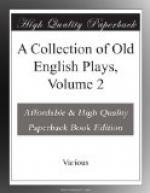And glide away
Like a spent exhalation.
Compare Henry VIII., III. 2, 226:—
shall
fall
Like a bright exhalation in the evening.
Fletcher does not repeat himself often, and these two exceptions are important.
IV. 4, is apparently by Massinger, but contains no repetitions.
IV. 5, is by Massinger. There are no clear Massingerisms, but the metrical style, and the allusion to Raleigh already mentioned, make it plain that the Scene is his.
V. 1, is also Massinger’s. The end of this Scene I have not seen, as pages 296-305 were missing in the proof-sheets I examined. Nearly all Scene 2 is also missing. It and the rest of the play seem to be Fletcher’s, who, as usual, spoiled Massinger’s fine conception of Barnavelt, and makes him whine like Buckingham in Henry VIII. This moral collapse of all energy in the face of death in the two characters is significant. Massinger would have carried out the scene in quite another tone. Some of the Fletcher scenes in this play, in which he has an unusually large share, are surprisingly good, and remind us of Fletcher at his best, in Philaster and the earlier plays. He fails here, as he always does, in the delineation of character. Nowhere is this break-down more characteristic than in Buckingham and Barnavelt. It gives the end of our play quite a wrench, and deprives Barnavelt of the sympathies which we had been forced to turn on him through his intrepid behaviour in the great trial scene. We had almost gained the conviction that his aims were really pure, and here we are called on to witness his utter collapse, in which he almost whines for pardon for his sins, and, like all worthless fellows without character seems actually to soften in gratitude to the man who sent him to his death.
This conclusion, I say, weakens the dramatic power of the close, but it does not prevent Sir John Barnavelt from occupying a high place among our dramatic treasures. R. BOYLE.
ST. PETERSBURG,
New Year’s Eve, 1882.
FINIS.
FOOTNOTES:
[1] Vid. Appendix.
[2] Reprinted in Mrs. Bray’s Tamar and the Tavy.
[3] Printed in The Court and Times uf Charles the First, &c. Edited, with an introduction and notes, by the author of Memoirs of Sophia Dorothea, Consort of George I., &c. (Vol. i. p. 104. London, 1848.) 8vo.
[4] Mr. Fleay thinks that Dick of Devonshire was written by R. Davenport. “The conduct of the plot,” he observes, “the characterisation, the metre, the language are very like the City Nightcap.” The reader must judge between us. I find it difficult to believe that Davenport could have preserved throughout five acts such clear directness of style.
[5] The old form of “pop-gun.”




